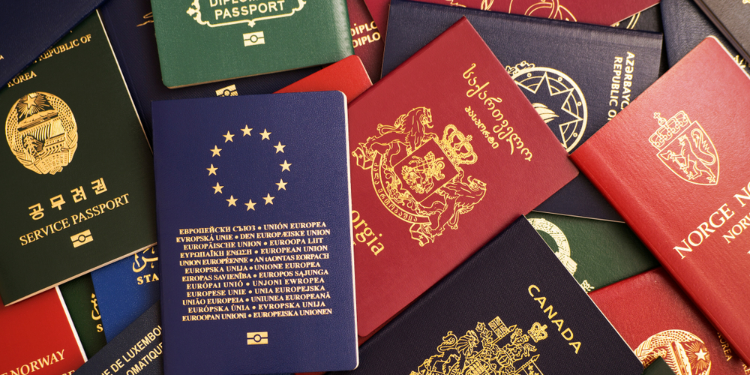
After the border reopening of most countries, many people are resuming their moving abroad plans. The passport is one of the most crucial formalities. Administrative offices have been taken by storm in the past few months by future travelers who want to renew their passports or make new ones. What rights are attached to a passport? Which are the world's most powerful passports? And what if you have a weak passport?
Rights attached to the passport
The passport is an official document issued by the state which allows people to move across borders into another country. The passport also allows citizens of the issuing country to prove their nationality abroad. But not everyone has equal passports. Some countries have more “powerful” passports, which allow their holders to travel to many countries without a visa (nearly 200 countries for the strongest passports). Conversely, other passports allow their holders to move around only a few countries without a visa (less than 30 countries for the “weakest” passports).
What are the world's most powerful passports and their benefits?
In 2022, the world's most powerful passports were the Japanese and Singaporean passports. Japan has topped the Henley & Partners ranking for the past 6 years, while Singapore followed in 2021. The citizens of these two states can travel to 192 countries without a visa. The least powerful passports are those of Syria, Iraq and Afghanistan. Just above these countries are Pakistan, Yemen, Somalia, Nepal, the Palestinian Territories and North Korea. Henley & Partners, a consultancy firm specializing in citizenship and residency, sees a link between the level of “peace” in a country and the strength of its passport. Bilateral agreements between countries also play a role, for they ease border control procedures.
Passport, travel and restrictions
Depending on their nationality, travelers can have more or less freedom of movement across borders. However, there are various levels of restrictions, starting from the complete absence of restrictions to the absolute requirement of a traditional visa.
- Visa exemptions
The least restrictive system is whereby travelers are exempted from a visa. Their passport is the only documentation required. They are free to move around countries that have signed bilateral agreements with their home country. Foreign nationals with “powerful” passports belong to this category: their passport allows them to travel to many countries without a visa.
- Visa on arrival
Expats can depart from their country with only their passport, but once they land in the host country, they need to pay for a visa. The procedure is straightforward enough and is carried out at customs. Travelers pay for their visa directly at the customs department, which issues them a document. Their passport will then be stamped. It's best to bring some cash in the local currency to facilitate this procedure. Comoros, Laos, the Maldives, Burkina Faso, Oman, Surinam and the Dominican Republic all require a visa on arrival (Surinam and the Dominican Republic call it a “tourist card”).
- Electronic System for Travel Authorization (ESTA)
Established in 2009, the ESTA allows some travelers to enter the American territory without a visa (a valid passport is enough), but only under certain conditions. The expat needs to hail from a participating country of the Visa Waiver Program. Among the participating countries are a large number of European countries (Belgium, Germany, Greece, France, Denmark, Spain, Austria, Slovenia, Ireland, etc.), Japan, South Korea, the United Kingdom, Taiwan and even New Zealand. Foreign nationals from these countries can request an ESTA to move around the United States freely without a visa. It's noteworthy that the ESTA is valid for 2 years, however, there is no guarantee that one's application will be automatically approved by American authorities. Immigration services can ultimately refuse entry to a traveler.
- Electronic visa required prior to departure
This alternative to the traditional visa has become even more widely used during the pandemic. It speeds up and modernizes the procedure. Expats are only required to have a passport and a good internet connection, which isn't always easy, even in countries equipped with fiber-optic cable. In France, for example, there still exist blind spots (areas with no network or very weak network). The electronic visa allows travelers to submit their applications entirely online. They must obligatorily have it before taking their flight. Canada, the United States, Djibouti, Kenya, South Korea, Dubai, Georgia and even Australia require an e-visa.
- Traditional visa required
The traditional procedure to obtain a visa is carried out at the embassy of the country one wants to travel to. The travelers must go to the embassy to file their applications in person. All of the formalities are done on-site. Travelers should envisage multiple appointments at the visa services in order to proceed with their application, and they will also have to bring their passport to get it stamped.
- Restrictions applicable to all international travelers
Important note:
* Visa exemptions and the conditions detailed above apply only to tourist trips (less than 90 days). Countries are also free to alter their regulations at any moment. Japan, for instance, now requires a visa for all tourist trips, even from countries with which it has signed a visa exemption agreement. It's wiser to contact the country's local embassy or consulate for any inquiry concerning passports, visas and the trip.
* Do not confuse the passport with the visa. A country can require both a passport and a visa to enter its territory, or it can require only a visa. Egypt, for example, requires a visa but not a passport. Other countries, like the United States, require a digital passport.
*The passport must be valid for at least 6 months after the scheduled return date.
What are your options for traveling with a weaker passport?
What should you do if you're not from a country participating in the Visa Waiver Program and you want to travel to the United States? What to do when your passport grants you a visa exemption in only some thirty countries?
- Traveling to the United States without ESTA
Foreign nationals from countries that are not participants in the Visa Waiver Program need to apply for a visa. Still, it's important to distinguish between two broad visa categories: non-migrant and migrant. The first applies to tourist trips, business trips, work or study. The second concerns all people who want to migrate permanently to the United States. Even then, a visa approval does not automatically guarantee the right of entry onto American territory. On arrival in the United States, immigration services might refuse you the right of entry. For example, they can judge that you didn't respect the Immigration and Nationality Act. Immigration could also consider that you are a threat to public safety.
- Traveling with a less powerful passport
It shouldn't be a surprise that less powerful passports have to follow more procedures and face more fees. Getting a visa is the only way to travel here. Things balance out when it comes to expatriation, which is technically considered a long trip (more than 90 days). All foreign nationals need to show a valid passport and visa (student visa, work visa, working holiday visa, etc.). Even if Covid has been a game-changer for visa exemptions, there's no doubt that these services will be back to normal sooner or later.
- The controversial Golden Visa option
In the end, having a powerful passport or not is outside the control of citizens of a particular state. It's up to states themselves to decide to sign a bilateral agreement or not. Some wealthy expats have, however found a loophole: the golden visa. This “gilded passport” opens the door to citizenship bought at the price of gold and allows its holders to enjoy the benefits of a powerful passport. For example, someone with a golden visa in Portugal can travel all around the Schengen Area. Getting Portuguese citizenship (the country recognizes dual nationality) automatically grants someone European Union citizenship. The Portuguese passport opens the door to visa-free entry into 187 countries. Aware of the potential risk posed by this visa, the European Commission has urged European countries to put an end to this program. They successfully appealed to Cyprus but not to Portugal, Spain, or Austria.
Conclusion
Your options are limited if you want to travel with a “weak” passport without paying for a visa. Binationals can eventually assert their double citizenship to make the best of the rights attached to each passport. The pandemic, however, has hindered the implementation of visa exemption plans (on the African continent, for instance). Other countries, like Japan, have preferred suspending visa exemptions even for the most “powerful” passports. The country is currently fighting its 7th Covid wave (with an unprecedented 200,000 new cases per day). These new Covid cases, according to early studies, are mostly young people under 30. What's to blame is the relaxed attitude of thirty-somethings and young people towards Covid risks (they, for example, often refuse to get a booster dose). Hospitals are once again overwhelmed and have rung the alarm bell with the authorities. Japan had just reopened its borders to tourist groups (on 10 June). The most optimistic were expecting a full reopening in the fall. Some are considering maintaining restrictions like the visa requirement, even for holders of “powerful” passports.



















